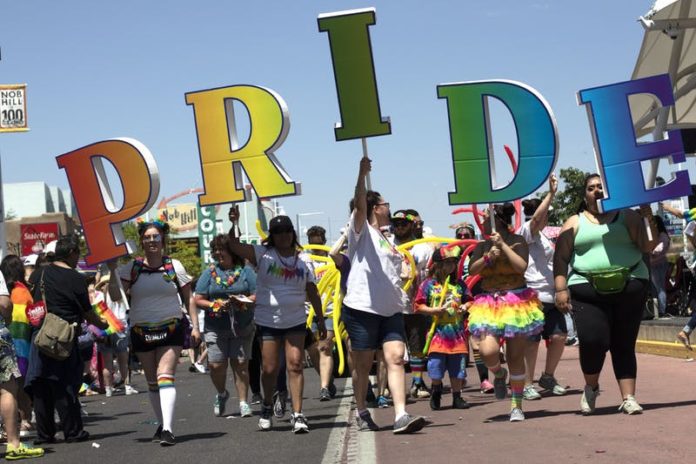
While the history of the LGBTQ+ advocacy movement is still being written and there is still much work to be done, there has been evidence of progress being made in New Mexico throughout the past century. The following is a timeline of the advancement of queer peoples and groups in New Mexico since the 1920s.
1920s: The early part of the LGBTQ+ rights movement had its own start in New Mexico as gay and lesbian artists and writers found safe spaces in cities like Santa Fe and Taos. The move to these cities proved that queer communities were drawn to smaller, rural areas and not just larger, urban locations.
1961: The New Mexico state legislature removed criminal punishment for consensual same-sex relations.
1969: The Stonewall Riots were a series of riots against the police in front the Stonewall Inn, a gay bar located in New York City. The riots, which occurred from June 28 to July 3 of that year, spearheaded the gay rights movement. This was led in large part by activist Marsha P. Johnson, causing ripples of movements to spark up across the nation. These riots marked a turning point for the activist movement, allowing for greater freedom for LGBTQ+ communities in states around the U.S., like New Mexico.
1976: Albuquerque’s first pride celebration was hosted by local advocacy group Juniper and the Metropolitan Community Church, both of which focused on “community, support and self-acceptance in the face of mainstream prejudice,” according to the New Mexico History Museum.
1977: An Albuquerque pride march in June 1977 was followed by a rally that featured New Mexico local Harry Hay as a speaker. Hay was a co-founder of the Mattachine Society, a gay rights advocacy group that started in the 1950s.
1983: A local drag and gay club called the Albuquerque Social Club officially opened, and quickly became the hub of the city’s queer community.
<!–/* oncampueWEB
Video Tag (responsive design)
InContent Expandable Tag (Responsive Design) – The tag will recognize the operating system of the device and resize the video player to 300×250 and pull the mobile targeted content when a mobile device is recognized.
Copy and place ad tag been two
or
Please call Will Dunning at 617-523-9802 if you have any questions.
*/ –>
1984: The New Mexico Gay Rodeo Association was established as a way to bring the western lifestyle to queer communities. It is still held once a year and fundraises for different causes, including helping individuals with AIDS that live in the state. The New Mexico Gay Rodeo Association is also part of the International Gay Rodeo Association.
2004: New Mexico’s Sandoval County began issuing marriage licenses to gay couples. The licenses were discontinued at the objections of Attorney General Patricia Madrid. Afterward, the validity of the licenses were questioned, but in 2013, Attorney General Gary King reaffirmed that the licenses issued were always valid.
2007: A Massachusetts state judge ruled that because of gender-neutral language in New Mexico laws, Massachusetts could issue marriage licenses to gay couples from New Mexico. At the time, gay marriage in Massachusetts was legal but out-of-state couples from other states where gay marriage was illegal (except New Mexico and Rhode Island) could not obtain a marriage license in Massachusetts. This ruling, which was allowed due to New Mexico’s vague legislative language, gave gay couples from New Mexico the right to get married in Massachusetts, even though the license would not be valid outside of Massachusetts.
2013: Same-sex marriage officially became legal in New Mexico.
2015: Gay marriage was legalized nationally by the U.S. Supreme Court.
Since the legalization of gay marriage federally in 2015, the push for acceptance and legal rights has not wavered within the LGBTQ+ community. With ongoing movements to fight for non-discriminatory legislation, having queer history taught in schools, continued legal acceptance of trans identities and more, the fight for queer and trans liberation is far from over.
Madeline Pukite is a beat reporter at the Daily Lobo. They can be contacted at culture@dailylobo.com or on Twitter @madelinepukite








